

The Nobel committee is muddled on the nature of economics. World’s Biggest Pension Fund Not Ready for Abenomics, Ito Says. Japan’s Government Pension Investment Fund, the world’s largest manager of retirement savings, isn’t ready for Abenomics, according to the head of an expert panel advising on public investments.
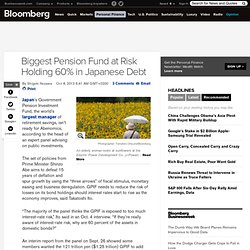
The set of policies from Prime Minister Shinzo Abe aims to defeat 15 years of deflation and spur growth by using the “three arrows” of fiscal stimulus, monetary easing and business deregulation. GPIF needs to reduce the risk of losses on its bond holdings should interest rates start to rise as the economy improves, said Takatoshi Ito. “The majority of the panel thinks the GPIF is exposed to too much interest-rate risk,” Ito said in an Oct. 4 interview. “If they’re really aware of interest-rate risk, why are 60 percent of the assets in domestic bonds?” Looting the Pension Funds. Taibbi writes: "All across America, Wall Street is grabbing money meant for public workers.
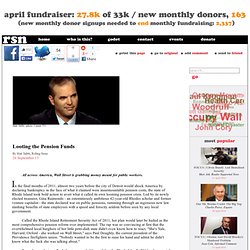
" By Matt Taibbi, Rolling Stone 26 September 13 All across America, Wall Street is grabbing money meant for public workers. Five Books: on Causes of the Financial Crisis. Barry Ritholtz is a Wall Street money manager and Washington Post columnist who writes a popular investment-focused blog, The Big Picture.
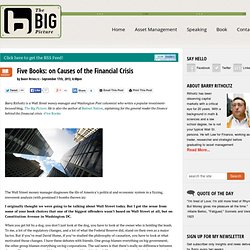
He is also the author of Bailout Nation, explaining for the general reader the finance behind the financial crisis -Five Books The Wall Street money manager diagnoses the ills of America’s political and economic system in a fizzing, irreverent analysis (with promised f-bombs thrown in) The Financial Crisis, Five Years Later. How Bad Was It? The Costs and Consequences of the 2007–09 Financial Crisis. Emerging Nations Save $2.9 Trillion Reserves in Rout. Developing nations from Brazil to India are preserving a record $2.9 trillion of foreign reserves and opting instead to raise interest rates and restrict imports to stem the worst rout in their currencies in five years.
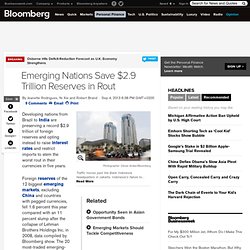
Foreign reserves of the 12 biggest emerging markets, excluding China and countries with pegged currencies, fell 1.6 percent this year compared with an 11 percent slump after the collapse of Lehman Brothers Holdings Inc. in 2008, data compiled by Bloomberg show. The 20 most-traded emerging-market currencies have weakened 8 percent in 2013 as the Federal Reserve’s potential paring of stimulus lures away capital. After quadrupling reserves over the past decade, developing nations are protecting their stockpiles as trade and budget deficits heighten their vulnerability to credit-rating cuts. Brazil and Indonesia boosted key interest rates last month to buoy the real and rupiah, while India is increasing money-market rates to try to support the rupee as growth slows.
Close. Fast Food Forward. Quantitative Easing is not Automatically A Keyensian Measure. Economics is the Study of Human Reaction Functions. Says John Aziz, “Economics, broadly defined, is the study of human action and interaction.”
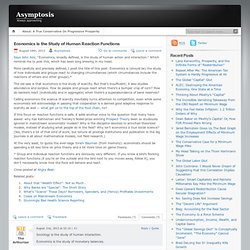
Which reminds me to post this, which has been long brewing in my head. More carefully and precisely defined, I posit the title of this post: Economics is (should be) the study of how individuals and groups react to changing circumstances (which circumstances include the reactions of others and other groups) . * Why Banks are “Special”: The Short Story. No, not that kind of “special.”
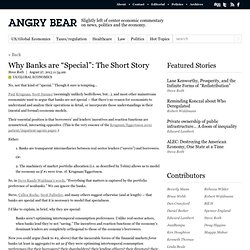
Though it sure is tempting… Paul Krugman, Scott Sumner (seemingly unlikely bedfellows, but…), and most other mainstream economists want to argue that banks are not special — that there’s no reason for economists to understand and analyze their operations in detail, or incorporate those understandings in their (mental and formal) economic models. Pinching Pensions to Keep Wall Street Fat and Happy. (Photo: Emmanuel Huybrechts / Flickr) The debate over public pensions shows clearly the contempt that the elites have for ordinary workers.
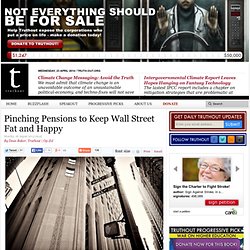
While elites routinely preach the sanctity of contract when it works to benefit the rich and powerful, they are happy to treat the contracts that provide workers with pensions as worthless scraps of paper. We see this attitude on display currently in the Detroit bankruptcy proceedings. America Resilient Five Years After Great Recession. Ethan Harris, former chief U.S. economist at Lehman Brothers Holdings Inc., recalls packing his family photos and top research into a suitcase five years ago on the Friday before the company went under.
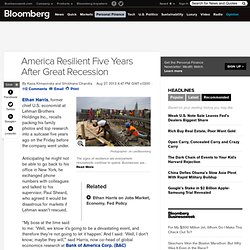
Anticipating he might not be able to go back to his office in New York, he exchanged phone numbers with colleagues and talked to his supervisor, Paul Sheard, who agreed it would be disastrous for markets if Lehman wasn’t rescued. Money and Sustainability. The Confidential Memo at the Heart of the Global Financial Crisis. Republicans’ “Market-Oriented” Health Care Reforms Won’t Work, Part 1. Republicans’ “Market-Oriented” Health Care Reforms Won’t Work, Part 1.
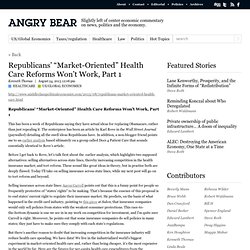
Manias, Panics, and Crashes. History is replete with episodes of manias, panics and crashes.
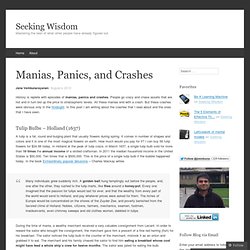
People go crazy and chase assets that are hot and in turn bid up the price to stratospheric levels. Bank of America Intern Death Sheds Light On Cutthroat World Of Aspiring Bankers. After learning that a summer intern within its investment banking unit had been found dead at his London student housing complex last week, Bank of America offered the other interns in his program the opportunity to call it quits. They all had just one week left on their contract, but, according to London's Financial Times, no one went home. Such devotion is part of a hard-charging, competitive culture that some blamed for the death of 21-year-old intern, Moritz Erhardt. Since he was found dead by flatmates in his London apartment, talk spiraled online suggesting long hours were at least partly to blame. On Friday, John McIvor, the London spokesman for Bank of America, told The Huffington Post the bank will convene a formal working group to look into Erhardt’s death, as well as to consider how to improve the work-life balance of the institution’s junior staffers.
Several former investment banking interns gave HuffPost a glimpse into the banking's hard-charging work environment. America's Gilded Capital. BILL MOYERS: This week on Moyers & Company… MARK LEIBOVICH: If you can sell yourself as someone who knows how Washington works, someone who has these relationships, someone who can get on the phone and get the president of the United States to pardon, you know, your fugitive client, that's a very, very marketable commodity. I mean, if you see-- if you are seen as someone who knows how this town works, someone who is a usual suspect in this town, you can dine out for years. That's why no one leaves. Fed Burned Once Over Taper Now Twice Shy on QE3. U.S. central bankers have $3 trillion of losses reminding them they had better get their communications right should they decide to taper their bond purchases.
That’s how much global equity markets declined in the five days after Federal Reserve Chairman Ben S. Bernanke’s June 19 remarks that he may reduce his $85 billion in monthly securities buying this year and halt it altogether by mid-2014. His comments pushed the yield on the benchmark 10-year Treasury to a 22-month high. Since then, he and his colleagues have sought to convince investors that paring stimulus doesn’t signal a tightening of monetary policy. They will need to reinforce that message to prevent another premature interest-rate rise if the Federal Open Market Committee goes ahead with the move, said Ward McCarthy, chief financial economist at Jefferies LLC in New York.
Capital Flows Back to U.S. as Markets Slump Across Asia. Asia’s role as the world’s growth engine is waning as economies across the region weaken and investors pull out billions of dollars. The Indian rupee fell to a record low today, Thailand is in recession and Indonesian stocks have slumped about 20 percent since their peak. Chinese banks’ bad loans are rising and economists forecast Malaysia will post its second straight quarter of sub-5 percent growth this week. The clouds forming in Asia as liquidity tightens and China’s slowdown curbs demand for commodities and goods are fueling a selloff of emerging-market stocks, reversing a flow of money into the region in favor of nascent recoveries in the U.S. and Europe.
Emerging markets from Brazil to Indonesia have raised borrowing costs in 2013 to try to aid their currencies as the prospect of reduced U.S. monetary stimulus curbs demand for assets in developing nations. Goldman Sachs Could Lose Up To $100 Million On Erroneous Trades: Report. A series of potentially erroneous trades made by Goldman Sachs Tuesday may ultimately cost the bank as much as $100 million, the Financial Times is reporting. Not Too Big to Jail: Why Eliot Spitzer Is Wall Street's Worst Nightmare. Eliot Spitzer in Union Square, New York, July 8, 2013. The bond market’s fear of Summers. Do We Want High House Prices or Affordable Housing? Lessons on the Government Debt. Matt Yglesias asked this question of President Obama on his twitter feed. Rise of New Corporatism Dims Capitalism, Argues a Nobel Laureate (Hint: Not Krugman) Obama Focuses on Risk of New Bubble Undermining Broad Recovery.
President Barack Obama, who took office amid the collapse of the last financial bubble, wants to make sure his economic recovery doesn’t generate the next one. Repo Market Decline Raises Alarm as Regulation Strains Debt. Regulations aimed at reducing the risk of another financial crisis are starting to upend a key part of the bond market that expedites trading in everything from Treasuries to junk bonds. The U.S. repurchase, or repo, market where banks and investors borrow and lend Treasuries and other fixed-income securities shrunk to $4.6 trillion daily outstanding last month, down 35 percent from a peak of $7.02 trillion in the first quarter of 2008, based on Federal Reserve data compiled from its 21 primary dealers. Mark Carney and first impressions in monetary policy. Much of modern monetary policy is concerned with managing inflation expectations. Chicago school of economics. Obama’s dangerously heroic view of the Fed. Here's Why You Need To Worry About The IPO Boom. Here's Why You Need To Worry About The IPO Boom.
Taking the Circular Flow to the limit of equilibrium. Labor share affects the potential of investment to raise GDP. “Profitless” Stocks, Underinvestment, the Cannibalization of Labor, and Levitating Stock Prices. Profitless stocks, labor, and higher stock prices. Beyond the horse race to lead the FED. Krugman & Kalecki, “injecting” to escape from a sub-optimal reality. Ricardo and his followers and Krugman. Extending the preliminary circular flow model with labor share. Rogoff Saying This Time Different Calls for Reflation. The Fed, Lawrence Summers, and Money. Labor share affects the potential of investment to raise GDP. Labor share affects the potential of investment to raise GDP.
U.S. Steps Up JPMorgan Probe Over Bear Stearns Mortgages. Conservatives once ridiculed Ayn Rand. Some Out-of-The-Box Suggestions For a New FRB Chairman. Central Bank Design. The Econtrarian. Fortress to Blackstone Say Now Is Time to Sell on Surge. Why is inflation so low?… asks Menzie Chinn. Labor Share, Inflation & Unit Labor Costs - Effective Demand. Angry Bear. The Fed Contenders: A Reading List. The Fed Contenders: A Reading List. Banks as Bookies. Forget Larry Summers. What if Roger Ferguson took over the Fed? Obama to Nominate Raskin as First Female U.S. Treasury Deputy. The trend in US corporate profits is what you think it is. Senate Democrats Ready Letter Urging Yellen as Fed Chief.
The Capital Spectator: The Correlation Conundrum. Here’s proof: Uncertainty didn’t hold back economy. What’s Powering the Strongest Bull Market Since WWII? Conservatives and Libertarians should Support the Return of Glass-Steagall. Larry Summers Fed Nomination Would Bypass 'Steady' And 'Right' Janet Yellen. SAC Capital Indicted By Feds. Three Thought-Provoking Central Banking Reads. Is the interest rate on reserves holding the economy back? Paul Krugman leads us to Effective Demand. The Business Desk with Paul Solman. Keynes vs. Hayek: Late Economists' Hip-Hop Legacy. The Big Picture. Detroit Bankruptcy Judge Rhodes Is Ponzi-Law Scholar. Morgan Stanley is having an identity crisis - Quartz. Angry Bear. Wall Street's Commodities Profit Threatened As Federal Reserve Launches Review.
Janet Yellen for Fed Chair. The self-cannibalisation of economics. Economics with a bang and a whimper.
Bernanke: Semiannual Monetary Policy Report to the Congress. Rational Expectations Revolution was Based on Fraudulent Intellectual History. It's College Students vs. the Corporate Machine - and the Machine's Winning. U.S. Stocks Rise as Bernanke Says No Preset Course for QE. BofA Beats Estimates as Profit Rises 63% on Expense Controls.
‘Fabulous Fab’ Trial: How to Create a Synthetic CDO - MoneyBeat. The Return of Larry Summers? Richard Cordray Confirmed As Consumer Financial Protection Bureau Director. SOI Tax Stats - Table 4: Returns of Active Corporations. Corporate Tax Rates Plummet As Profits Soar. Interest rates 101: Why the party is over. The Big Backlash.